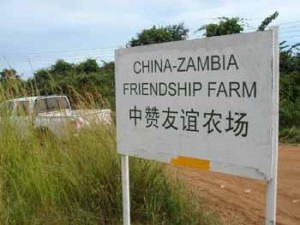"Decades ago we were at the forefront of China's campaign to reclaim wasteland. Now we apply our skills in African countries," says Han Xiangshan, vice president of the China State Farm and Agribusiness Corporation (CSFAC), and chief of its agricultural projects in Africa. Mr. Han has a passion for Africa, and takes personal satisfaction in the company's upcoming bumper sisal harvest in Tanzania after three and a half years of effort.
Sisal is one of Tanzania's staple crops, formerly grown on state-owned plantations. In the 1960s Africa's sisal output made up more than 60 percent of the world total, but by 1997 this proportion had dropped to 20 percent. Since the 1970s sales of sisal have dwindled and its prices plummeted due to inefficient management, increasing competition in the international market and synthetic substitutes. Privatization of state-owned plantations exacerbated the situation as cut-throat methods of operation brought a further decline in sisal production.
When China State Farm and Agribusiness Corporation entered Tanzania in 2000, most local sisal farms had become wasteland. The corporation purchased two abandoned farms whose combined land amounted to 5,900 hectares. "The soil is fertile, but its cultivation called for modern technology and management methods. We have wide experience in sisal planting and processing from our operations in Guangdong and Guangxi, and brought our best technicians out here," recalls Mr. Han.
In June, 2002, the two farms were evaluated by the Tanzanian Ministry of Agriculture and Sisal Association as the best managed sisal farms in Tanzania. The farms also stimulated the local economy, earning the 300 to 400 local residents working on them US $30 per month, the highest level in the region. Says Mr. Han, "Before we came and opened up the wasteland, taught the local people about technology, and promoted their processing exports they had barely any source of income."
The China-Zambian Friendship Farm near Lusaka is another CSFAC success in Africa. Before purchasing its first farm here the corporation did careful market research, and decided to grow wheat. To tackle the problem of water shortage, it bored for artesian water, and applied unified sprinkler irrigation, ensuring an adequate water supply for crops. For years the farm's wheat yield stayed around 400 kilograms per mu (1 mu=1/15 hectare), one of the highest in Zambia, and by the end of the dry season of 2002 the farm had made a profit of more than US $1.5 million. Encouraged by its initial success, the corporation bought a second farm in Zambia for raising table chickens, and in the years 2001 and 2002 successively earned more than US $400,000. It later bought another farm for growing vegetables, raising cattle, cows, chickens and fish for supply to neighboring cities.
The CSFAC went on to co-found with the Guinea Ministry of Agriculture the Sino-Guinea Agricultural Cooperation and Development Company and Koba Farm. These efforts won recognition from the Guinean President and Minister of Agriculture who said: "The Sino-Guinea agricultural cooperation project has achieved anticipated economic and social benefits. It is an example of Guinean/foreign as well as south/south cooperation." In a bid to promote Sino-African agricultural cooperation, the CSFAC collaborated with the China Hybrid Rice Engineering Research Center in introducing to Africa high yield hybrid rice developed by Yuan Longping, known as father rice in China. In January 2003 Chinese experts went to Guinea and successfully conducted high-yield breeding and cultivation experiments. On April 28, the two parties invited the Guinean Minister of Agriculture, senior officials of relevant departments, and FAO representatives to Guinea, as well as the Chinese Ambassador and commercial advisor, to inspect their hybrid high-yield rice field. All were highly impressed. Establishment of a hybrid rice cultivation center in Guinea will alleviate grain shortages in Africa and also bring the CSFAC good economic returns.
In other African countries, including Ghana, South Africa and Togo, the corporation has founded 11 agricultural production, processing and sales projects, and runs a total of 16,000 hectares of farmlands. They supply a great variety of agricultural products and have created thousands of jobs.
Han Xiangshan attributes the CSFAC's success to four main factors. First is the political and policy support by African governments in the form of preferential policies for expansion of the agricultural sector, tax exemption on agricultural machinery and production material imports, and tax rebates on fuel for agricultural use. Tanzania, for instance, reduced its annual land rent from 600 to 200 Shillings (less than 2 yuan) per hectare. The second is Africa's fertile soil, abundant sunshine and rainfall, and the third China's capability of meeting the demands of Africa's agricultural market in terms of technology, management, machinery and equipment. Fourth, and according to Mr. Han's experience most important, is meticulous pre-project market research. Chinese companies are obliged to do thorough research into local markets before entering into cooperation with African countries. Key aspects are political and natural risks, market potential, ideology gaps and work efficiency.
Mr. Han's experience in the latter came at a price. The CSFAC once rented a farm in Mauritania, and spent three years on reclamation, experimentation and cultivation, bringing the rice yield up to 5 tons per hectare. During this time the annual rental increased at a rate of 20 percent, and local prices for petroleum soared, increasing the farm's annual expenditure by over US $100,000. The local government then put limits on the prices of agricultural products. The corporation consequently lost hundreds of thousands of dollars in three years - no small sum to a state-owned enterprise earning unspectacular profits. This loss still rankles with Mr. Han, and is why he stresses the importance of market research.













